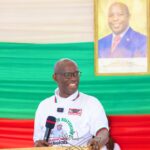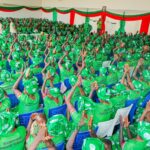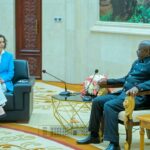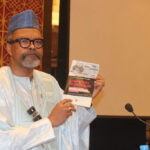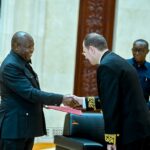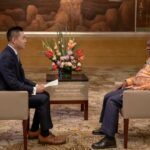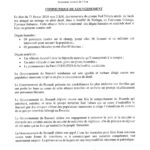By Eddie Haywood and Thomas Gaist 8 June 2017
Tensions on the African continent are rising with China’s surge of economic investment and business ties with a host of countries. In response, Washington and Europe are countering this ‘economic trespassing’ by Beijing with the utilization of massive military power across the continent. Underpinning the conflict are the Western corporations and banks eager to capture the profits extracted from Africa’s vast economic resources and its working masses.
China’s expansion of economic investment in Africa is a part of its “One Belt, One Road” initiative through which Beijing seeks to revive a modern-day “Silk Road” trade route connecting China and Asia with Europe. The proposed expansion of transport and communications infrastructure is aimed at boosting the trade and economic interlinkages of China across Eurasia and with Africa and the Middle East at the expense of the US, thus undermining its global domination.
The profiteering and exploitation of cheap labor by China in Africa is hardly benign and has prompted criticism, some of which, but not all, is prompted by those seeking to limit the expansion of China’s economic influence. While China is not an imperialist power, its capitalist operations in Africa are no less predatory than its rivals in the United States and Europe.
The Belt and Road Forum for International Cooperation, held in Beijing May 14-15, marks a significant turning point in China-Africa relations and in world politics as a whole. From all appearances, at least three strategically crucial East and Central African states, Kenya, Rwanda and the Democratic Republic of the Congo, all military allies of the United States, are shifting decisively toward the Chinese government and its One Belt, One Road (OBOR) agenda.
This expansion of Chinese influence in Africa directly threatens American imperialism’s control over the lion’s share of Africa’s natural riches and disrupts Washington’s efforts to encircle China and strangle it economically.
In an interview following the Belt and Road Forum for International Cooperation, Kenyan President Uhuru Kenyatta signaled his government’s readiness for closer ties with China, necessarily at the expense of US-Kenya relations, in exchange for a reduction of Kenya’s trade deficit.
“If their win-win strategy is going to work, it must mean that, just as Africa opens up to China, China must also open up to Africa,” Kenyatta said. “The Belt and Road initiative gives our continent the opportunity to make a paradigm shift. Post-colonial Africa has been stuck in a rut.”
Even though Rwanda, one of the US military’s favored allies on the continent, was not invited to Beijing, Rwanda’s envoy to China, General Charles Kayonga, celebrated China’s OBOR as a positive development for Africa’s economy.
“The Belt and Road project, reaching Rwanda and beyond, will be a leap forward in the process of integrating Africa into the global economy and enhancing its political integration,” Kayonga said. “Western countries are critical because of their history in Africa. They were in Africa for centuries, but what do we see in the continent of Africa? Colonization and neo-colonization. Now, there’s a change on the face of Africa with Chinese involvement in the last three decades.”
“The Western kind of aid, most of the times, is political and is tied to some conditions, which China doesn’t do. I see China-Rwanda cooperation as a win-win partnership. I think this is the best for Africa,” he said.
The enthusiasm of Africa’s capitalist elites for the OBOR is a powerful index of the realignments taking place within the continent’s political order. Immense pressures are being brought to bear on Africa’s political system.
African governments and political establishments are torn between their military-political ties to the flagging American superpower and the potential gains from closer ties with Beijing, whose economic investments on the continent increasingly dwarf those of the US. The politics of the entire continent are being set on knife’s edge by the explosive interaction between the US drive to counter the breakdown of its hegemony through war and the emergence of China as a leading global economic power.
As part of the OBOR China is seeking to extend its new maritime Silk Road to Africa, and has committed $3 trillion to developing shipping lanes in the Indian and Atlantic Oceans linking the west and east of the continent to Asia and southern Europe. Beijing is also proposing massive investment in highway and rail line projects that will span the continent.
For their part, the African governments are seeking out economic agreements with Beijing because the terms are seen as more beneficial. Chinese loans are tied to more market-based interest rates compared to the strings attached to financial aid programs and loans offered by the US and Europe.
US and Europe seek to impose conditions, such as favorable tax rates (or none) for their corporations doing business in the country, and the agreement to hand over the reins of entire economic sectors and industries completely to Western corporations and banks.
Over the past decade, China has made deep economic inroads into Africa. In the 2000-2015 period, China has invested or loaned $94.4 billion. In the last year alone, China committed $30 billion to Kenya alone.
The extensive investment projects China has undertaken in Africa include infrastructure, such as roads, power generation, telecommunications, and hospitals; and in the development of Africa’s resources, such as mining and oil extraction and refinement. Additionally, China has established trade relations with many African nations, exporting many Chinese products to the continent.
In the Congo, China has secured a contract with the government of Joseph Kabila for the largest cobalt mine in the world, representing some 62 percent of global production.
On June 1, Kenya’s Standard Gauge Railway opened a new line for passengers between the port city of Mombasa and the capital Nairobi, thanks to a $3.2 billion loan from Beijing. In addition, a line is now open for commercial freight traffic between the two cities, and is expected to greatly enhance and streamline cargo transport.
Plans for the railway include the extension of the line into the neighboring countries of Uganda, Rwanda, and the Congo.
The African component of OBOR includes linkages connecting economic centers in Kenya, South Sudan, Uganda, Djibouti, Ethiopia, Tanzania and Angola to ports on both Africa’s Indian Ocean and Atlantic coastlines. The Chinese government is currently planning or building port complexes in Cameroon, Ghana, Tunisia, Gabon and Senegal, as well as pursuing dozens of other major infrastructure projects across the continent, including airports, power plants, sports arenas, and bridges.
The maritime component of China’s OBOR runs alongside thousands of miles of Africa’s eastern seaboard, from Mombasa north along the entire coastline of Somalia, where half of Chinese oil imports must pass through the narrow Mandeb Strait, just beside the largest US military base in Africa, Camp Lemmonier in Djibouti.
The contradiction between the interests of American imperialism and those of Chinese capitalism is fueling militarism and wars across the African continent. The American ruling class will never peacefully accept the realization of Beijing’s OBOR agenda in Africa, nor on any other continent.
It is increasingly clear that US military operations in Africa are focused on projecting power against Chinese interests. US Africa Command (AFRICOM) deployments are concentrated on Africa’s central heartland and around the transport corridors and port facilities that feed into the Indian Ocean.
The US-China strategic conflict in Africa finds sharpest expression in Congo. Congo’s mineral fields alone contain over 90 percent of the world’s cobalt, the rare earth metal necessary to the production of modern electronics and smart phones.
Washington’s drive to assert control over the mineral fields in eastern Congo has already produced two Congo wars in the two decades, leading to the deaths of millions. US aggression against the Congo, driven inexorably forward by the insoluble crisis of American and world capitalism, is leading a third and larger Congo war.
There are increasing signs that Washington is preparing to move against the Kabila government in Kinshasa. President Kabila bucked Western demands that he leave office at the beginning of 2017, and on May 11 announced the formation of a new government, appointing Bruno Tshibala as prime minister.
Kabila faces a country in chaos. The value of Congolese currency has plunged by 50 percent since beginning of 2017. The American media is promoting Moise Katumbi, former governor of Congo’s Katanga province, as a suitable replacement. Reports indicate that Katumbi has travelled to Europe in an effort to position himself as the leader of de-stabilization operations against Kabila.
A logical infrastructure plan for linking Africa’s Indian and Atlantic Ocean coasts would cut directly through the heart of Congo, the largest and wealthiest country in the region. Instead, Beijing plans to bypass Congolese territory with two corridors, skirting around the northern and southern borders of Congo. This decision was obviously taken in consideration of the dozens of feuding militias and mercenary groups which emerged directly out of the CIA-backed wars. Washington has employed these forces for decades in an effort to seize direct control of Congo’s resources on behalf of American corporations and destabilize Congo’s central government.
[ https://www.wsws.org/en/articles/2017/06/08/chin-j08.html ]

